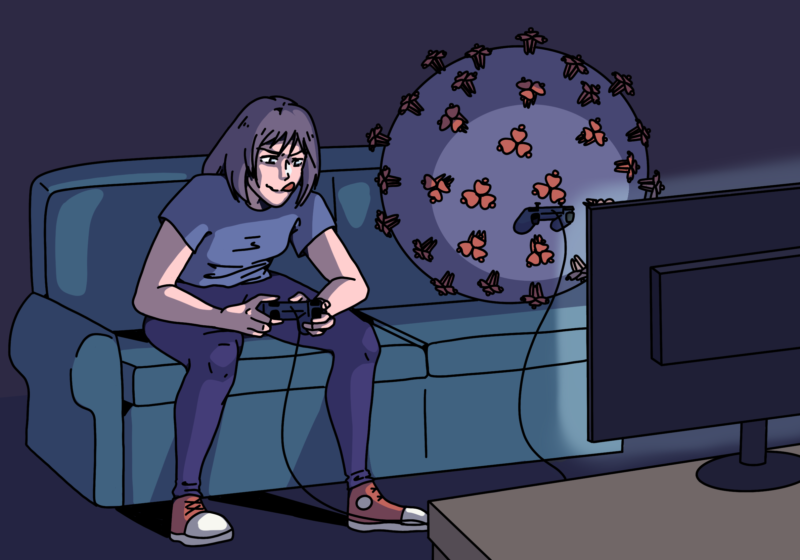Last week, I spoke about the music that brought us together this year, even as we were 6 feet (or more) apart. Music in 2020 also ventured into previously uncharted territory — namely, video games. For starters, players hosted massive virtual raves and music festivals on Minecraft, featuring artists such as 100 gecs, Charli XCX, and American Football. Even more remarkably, 2020 saw Travis Scott release his single “The Scotts” and perform a 15-minute set within the popular game Fortnite for over 12 million live viewers.
Video games, more than ever, also connected people who were in search of a sense of community, with the World Health Organization even partnering with popular gaming companies to launch a #PlayApartTogether campaign last April. The pandemic popularized gaming apps such as “Houseparty,” “Skribbl.io,” and Jackbox games, all of which enable users to join a private room from anywhere in the world and play classic party games like Heads Up and Trivia. As live sports were cancelled, 7 million new gamers took up FIFA, and NBA 2K20 saw an 82% increase in players. Other notable games that occupied old and new enthusiasts alike included “Call of Duty: Warzone,” “World of Warcraft,” “The Last of Us 2,” and the controversial “Cyberpunk 2077.”
However, gaming is a luxury, especially during a pandemic where so many people continue to face unemployment and salary cuts. First-year Giovanni Correa-Quiñones pointed out that games like “Call of Duty” and consoles like PlayStation come out with new editions every few years, which can lead to gamers feeling pressured to keep up with their peers. Ironically, perhaps the social nature of these games contributes to that feeling of missing out on spending time with friends who have the resources to move on to the next newest trend.
In addition to this economic barrier, striking a balance between the virtual and real world has become increasingly difficult. For this reason, although he was an active gamer pre-pandemic, Zoom fatigue has made Correa-Quiñones’s gaming time plummet.
“It’s so time consuming when I’m on Zoom,” he said. “I’m a people person, and I get tired of looking at screens.” Correa-Quiñones instead prioritizes in-person connections over further screen time and remains concerned for loved ones whose mental health, physical health, and social relationships have suffered as a result of their constant exposure to screens.
Furthermore, despite narrative-heavy games such as “The Last of Us 2” presenting an opportunity for players to step into an alternate dimension when many were restricted from so much as leaving their houses, WIRED writer M.J. Lewis also examined another consequence of pandemic fatigue: “narrative exhaustion.” Pandemic-weary, millions were drawn to more low-stakes games such as “Among Us,” “Fall Guys,” and “Animal Crossing.” Even as I reverted back to “Pokémon Emerald” and “Harvest Moon: Friends of Mineral Town” and downloaded a GameBoy Advance emulator to try and replicate the sense of comfort I associated with these games, my phone notifications were flooded with “Among Us” room codes. In fact, anyone who was on the internet between March and November of last year is probably familiar with the “Among Us” content that seemed to saturate social media — memes, Twitch streams, YouTube videos, you name it. The game’s sudden popularity was no coincidence; during a period when many had not seen their loved ones in weeks and lacked the mental and emotional bandwidth to play more time-consuming games, “Among Us” provided an accessible yet stimulating format to blow off steam and connect with strangers, friends, or both.
“It’s one of the most interactive games that one can play,” Correa-Quiñones said. As Programming Chair for the 2024 Class Council, he had a role in organizing Game Night for the Class of 2024, where students came together to play “Among Us” and “Skribbl.io.” He mentioned that gaming is a double-edged sword — you can see it as a draining activity, or as a rejuvenating way to make friends.
The latter was certainly true for Game Night, which he helped host because he realized that right now, “if you want to connect with people, the only way to do it is remotely.” Since then, Correa-Quiñones has also played “Among Us” with a number of other student clubs at UR and maintains that video games are an excellent way to strengthen social connections when played in moderation.
An appeal similar to that of “Among Us” is what contributed to the “Animal Crossing: New Horizons” phenomenon. The Nintendo Switch game, which the New York Times dubbed “a conveniently timed piece of whimsy,” garnered immense acclaim — and for good reason. It is set in an idyllic universe where players tend to their land and interact with endearing characters at a leisurely pace, unfettered by impending deadlines or real-world anxieties. This escapist premise and the stress-free gameplay that accompanies it makes for a relaxing, cathartic experience. In addition, the game also lets players travel to each other’s islands and trade in a marketplace, allowing them to expand their real-life relationships without breaching COVID-19 protocol. Heartwarming stories about Animal Crossing enabling togetherness were widespread at one point, with people celebrating their birthdays on their islands and one couple getting married in-game after their wedding was cancelled due to the pandemic.
Despite gaming being an imperfect substitute for real-life connection, it undoubtedly brought us solace, joy, and relief amid an onslaught of grief, uncertainty, and loneliness. This month marks the one-year anniversary of humanity being cooped up indoors, and like any other notable era in history, our perception of this time will be filtered through its social and political climate. Simultaneously, we will also look back on this period through the lens of the art that defined it, and as one of the most immersive forms of entertainment, video games have made a definitive mark on our shared memory of the pandemic.



